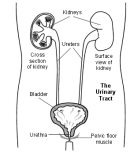RIGID URETEROSCOPY
Discharge information for patients
Humans usually have two kidneys at the back of the abdomen at the lower part of the ribs, one on each side of the
body. The kidneys filter the blood and make urine. Each kidney is connected to the bladder by a tube called the ureter, through which urine drains. A rigid ureteroscopy is an examination
of the ureter using a fine telescope called a ureteroscope. A ‘right’ or ‘left’ ureteroscopy indicates which ureter requires examination.A rigid ureteroscopy is usually performed under a
general anaesthetic (when you are asleep) so that one of a number of possible procedures may be carried out in one of your ureters depending on your urological condition. For
example, to remove stones with a ‘basket’ or by ‘crushing’, take a tissue sample (biopsy), or to dilate a narrowing (stricture) in the ureter.
Any planned treatment will have been discussed with you before your operation by your medical team and your written
consent obtained.
After a ureteroscopy most patients have an uneventful recovery and are discharged home the same day. When you have had a general anaesthetic or sedation it is important that you do not drive a car, drink alcohol or handle machinery for 24 hours post-op. You should therefore arrange for someone to collect you from hospital. However, it may be necessary to insert an internal stent (thin tube) into the ureter at the time of the operation which means you may stay in hospital a little longer. This stent usually remains in place for a few days to a few weeks to aid the healing process, and you will be discharged with this stent. Arrangements will be made for it’s removal under a local (you are awake) anaesthetic. This removal is very important and you must ensure you have a date to attend hospital in the near future before you are discharged.
For about 72 hours after your operation, especially if you have a stent, you may pass urine frequently, experience a mild burning sensation on passing urine, and/or see a little blood in the urine. Drinking plenty of fluids (approximately 2 litres /4 pints per 24 hours) and resting as much as possible may help to reduce these symptoms. It is particularly important to drink this amount if you have had stones removed with this procedure.
If symptoms persist and you notice that your urine is cloudy and/or has an offensive smell, please contact your GP so that a urinary infection may be ruled out. If you were discharged from hospital with antibiotics, it is important that you complete the course as instructed.
After a ureteroscopy most patients have an uneventful recovery and are discharged home the same day. When you have had a general anaesthetic or sedation it is important that you do not drive a car, drink alcohol or handle machinery for 24 hours post-op. You should therefore arrange for someone to collect you from hospital. However, it may be necessary to insert an internal stent (thin tube) into the ureter at the time of the operation which means you may stay in hospital a little longer. This stent usually remains in place for a few days to a few weeks to aid the healing process, and you will be discharged with this stent. Arrangements will be made for it’s removal under a local (you are awake) anaesthetic. This removal is very important and you must ensure you have a date to attend hospital in the near future before you are discharged.
For about 72 hours after your operation, especially if you have a stent, you may pass urine frequently, experience a mild burning sensation on passing urine, and/or see a little blood in the urine. Drinking plenty of fluids (approximately 2 litres /4 pints per 24 hours) and resting as much as possible may help to reduce these symptoms. It is particularly important to drink this amount if you have had stones removed with this procedure.
If symptoms persist and you notice that your urine is cloudy and/or has an offensive smell, please contact your GP so that a urinary infection may be ruled out. If you were discharged from hospital with antibiotics, it is important that you complete the course as instructed.


